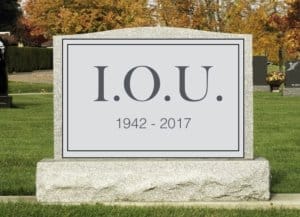Owed Money from a Dead Person? File a Claim Against the Estate
Are you owed money from a dead person? The example below explains the law around filing claims against an estate.
Harry and Jesse were friends for many years. During the last year of Jesse’s life, Harry spent a small fortune taking care of Jesse. Harry paid for Jesse’s home care aides, bought Jesse food, paid for Jesse’s travel to and from the doctors, and even paid for a portion of the funeral. After Jesse died, Harry added up the expenses and saw that he had spent well over thirty thousand ($30,000) dollars on his good friend. Could he be reimbursed for his expenses, he wondered?
How Do I File a Claim Against the Estate?
Article 18 of the New York Surrogate’s Court Procedures Act allows for a creditor to be reimbursed for debts and funeral expenses.
The claim should be in writing, contain a statement of the amount of money due and contain a statement of what the money was used for. The creditor should also include a sentence indicating that they have not been paid for any portion of the claim that they are presenting.
The claim should be presented to the fiduciary of the estate within seven months after the appointment of a fiduciary (executor, administrator, temporary administration, or preliminary executor). The statute requires that the claim be presented either personally (hand delivered) or sent by certified mail, return receipt requested to the address that the fiduciary provided to the court when he applied to become a fiduciary.
Once the claim has been properly presented, the fiduciary has 90 days to accept or reject the claim. If the fiduciary accepts the claim, then the fiduciary will pay the creditor, usually at the time of settlement of the estate. If you don’t hear from the fiduciary within 90 days, then you can assume that the claim has been rejected.
What Happens if the Fiduciary Rejects the Claim against the Estate?
If the fiduciary rejects your claim, you can ask the Court to determine the validity of your claim. This is done by a Petition to Determine the Validity of the Claim. You would file an Order to Show Cause and a Petition and ask the Court to order the fiduciary to pay the claim. The Court could decide the claim as part of this petition or defer the claim to the accounting proceeding.
Summarily, Harry can seek reimbursement for his expenses and should follow the procedures outlined in Article 18.
Additional resources provided by the author
For more information, please contact NYC Probate Litigation, Guardianship, NYC Probate and Estate Planning attorney Regina Kiperman:
Phone: 917-261-4514
Fax: 929-556-2089
Email: rkiperman@rklawny.com
Or visit her at:
40 Wall Street
Suite 2508
New York, NY 10005
Visit Regina on LinkedIn
Visit Regina on Facebook
This page is made available by the lawyer for educational purposes only as well as to give you general information and a general understanding of the law, not to provide specific legal advice. By using this site you understand that there is no attorney client relationship between you and the lawyer. The post should not be used as a substitute for competent legal advice from a licensed professional attorney in your state. ATTORNEY ADVERTISING.
